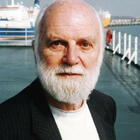
Douglas E. Harding (1909-2007) was a very valued and loved philosopher and spiritual master, as well as a prolific writer, who developed a unique way of waking the source, of seeing who we really are. His approach, as direct and effective as practical and original, is right to the heart, to the central nucleus of the matter and leads us directly to our true nature, to our divinity.
Douglas was born in Suffolk, England, in 1909, in an evangelical Christian family called the exclusive brothers of Plymouth. In his childhood he was deprived of all contact with the ordinary world. He progressively was questioning the theology and way of life of the sect, until at twenty -one, he apostated, determined to discover for himself the truth behind all religions. To do this, he began an extensive study of philosophy, religion, physical science and psychology.
During this period, Harding also practiced architecture in London and then served in the Indian army as commander during World War II. It was at this time that he made the initial empirical discovery, which is the heart of his philosophical work. Subsequently, he suspended his practice of architecture and spent eight years investigating the implications of his discovery. This culminated in the publication of The Hierrachy of Heaven and Earth in 1952. The Saturday Evening Post later commissioned Harding to write an article for his series Adventures of the Mind. Then Harding wrote on Having No Head, in which he establishes a bond between his vision and Zen Buddhism. Subsequently, Harding returned to architecture, worked for several years in India and then in Suffolk, England.
In 1969, Harding retired from architecture to dedicate his energy to communicate his message in every possible way. Since then, while keeping workshops around the world and writing articles for magazines, he has written several books. He died in January 2007, shortly before turning 98.




